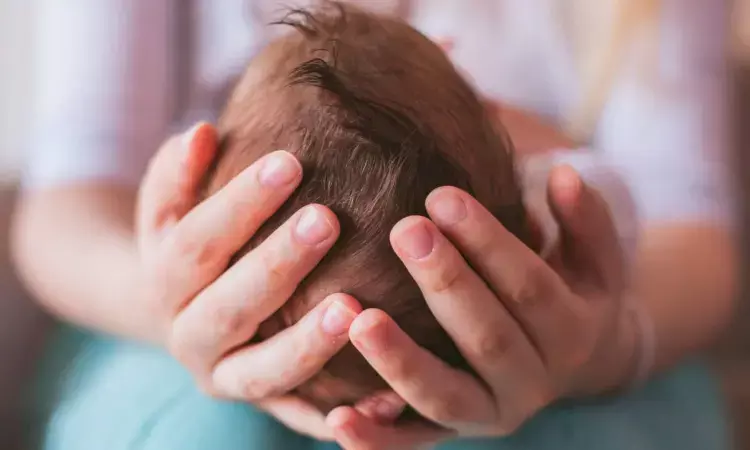- Home
- Medical news & Guidelines
- Anesthesiology
- Cardiology and CTVS
- Critical Care
- Dentistry
- Dermatology
- Diabetes and Endocrinology
- ENT
- Gastroenterology
- Medicine
- Nephrology
- Neurology
- Obstretics-Gynaecology
- Oncology
- Ophthalmology
- Orthopaedics
- Pediatrics-Neonatology
- Psychiatry
- Pulmonology
- Radiology
- Surgery
- Urology
- Laboratory Medicine
- Diet
- Nursing
- Paramedical
- Physiotherapy
- Health news
- Fact Check
- Bone Health Fact Check
- Brain Health Fact Check
- Cancer Related Fact Check
- Child Care Fact Check
- Dental and oral health fact check
- Diabetes and metabolic health fact check
- Diet and Nutrition Fact Check
- Eye and ENT Care Fact Check
- Fitness fact check
- Gut health fact check
- Heart health fact check
- Kidney health fact check
- Medical education fact check
- Men's health fact check
- Respiratory fact check
- Skin and hair care fact check
- Vaccine and Immunization fact check
- Women's health fact check
- AYUSH
- State News
- Andaman and Nicobar Islands
- Andhra Pradesh
- Arunachal Pradesh
- Assam
- Bihar
- Chandigarh
- Chattisgarh
- Dadra and Nagar Haveli
- Daman and Diu
- Delhi
- Goa
- Gujarat
- Haryana
- Himachal Pradesh
- Jammu & Kashmir
- Jharkhand
- Karnataka
- Kerala
- Ladakh
- Lakshadweep
- Madhya Pradesh
- Maharashtra
- Manipur
- Meghalaya
- Mizoram
- Nagaland
- Odisha
- Puducherry
- Punjab
- Rajasthan
- Sikkim
- Tamil Nadu
- Telangana
- Tripura
- Uttar Pradesh
- Uttrakhand
- West Bengal
- Medical Education
- Industry
Postpartum depression in mothers affects infant's language development: JAMA

Germany: A new study published in the Journal of American Medical Association found that children's speech perception trajectories are associated with subclinical depressive moods of postpartum mothers.
Speech perception provides a foundation for language development, and early disturbances increase the chance of subsequent language issues. Despite the fact that a major postpartum depressive episode is linked to language development, this correlation has not been studied in infants of mothers who had subclinical depressive episodes after giving birth, despite the fact that such a mood is frequently present in the first few weeks after birth. Given the availability of coping mechanisms for subclinical sad mood, it is crucial to determine if a subclinical depressed mother's mood following childbirth is connected with early language development.
46 healthy, monolingual German mother-infant pairs were assessed as part of this longitudinal cohort research, which was performed between January 1 and October 31, 2018. The Max Planck Institute for Human Cognitive and Brain Sciences database of babies was used to draw the sample. The moderation analysis was carried out between July 1 and July 31, 2022, while the first statistical analysis was done between January 1 and March 31, 2021. When their children were 2 months old, mothers completed the German version of the Edinburgh Postnatal Depression Scale to report their postpartum mood. When the newborns were 2 months old (first assessment) and 6.5 months old (testing), electrophysiological correlates of baby speech perception were examined (follow-up).
The key findings of this study were:
1. At the first evaluation, a total of 46 women and their 2-month-old babies took part, and at the follow-up, 36 mothers and their then 6.5-month-old babies did as well.
2. According to moderate analyses, lower longitudinal changes in the babies' electrical brain responses to speech information from ages 2 to 6.5 months were related to more sad maternal subclinical postpartum mood.
In conclusion, this study paves the way for further investigation into the relationship between early intervention for caregivers who are depressed and children's language development.
Reference:
Schaadt, G., Zsido, R. G., Villringer, A., Obrig, H., Männel, C., & Sacher, J. (2022). Association of Postpartum Maternal Mood With Infant Speech Perception at 2 and 6.5 Months of Age. In JAMA Network Open (Vol. 5, Issue 9, p. e2232672). American Medical Association (AMA). https://doi.org/10.1001/jamanetworkopen.2022.32672
Neuroscience Masters graduate
Jacinthlyn Sylvia, a Neuroscience Master's graduate from Chennai has worked extensively in deciphering the neurobiology of cognition and motor control in aging. She also has spread-out exposure to Neurosurgery from her Bachelor’s. She is currently involved in active Neuro-Oncology research. She is an upcoming neuroscientist with a fiery passion for writing. Her news cover at Medical Dialogues feature recent discoveries and updates from the healthcare and biomedical research fields. She can be reached at editorial@medicaldialogues.in
Dr Kamal Kant Kohli-MBBS, DTCD- a chest specialist with more than 30 years of practice and a flair for writing clinical articles, Dr Kamal Kant Kohli joined Medical Dialogues as a Chief Editor of Medical News. Besides writing articles, as an editor, he proofreads and verifies all the medical content published on Medical Dialogues including those coming from journals, studies,medical conferences,guidelines etc. Email: drkohli@medicaldialogues.in. Contact no. 011-43720751


